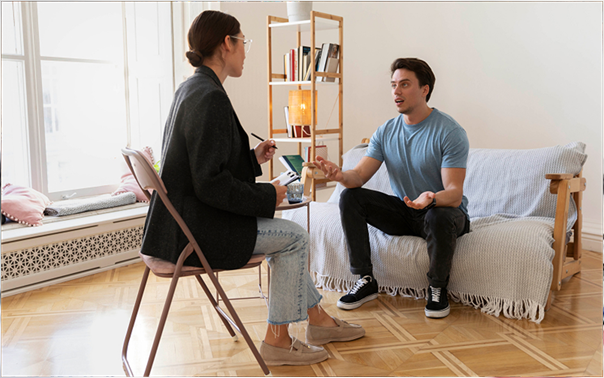Couples experience conflicts, misunderstandings, and periods of disconnect. Without proper tools, minor issues turn into communication breakdowns. Seeking guidance from a mental health counselor offers structured support. These professionals help couples identify patterns, understand each other better, and rebuild healthy dialogue.
Learning Emotional Triggers
Couples often argue without identifying emotional triggers behind their reactions. A mental health counselor observes these behaviors during sessions. They guide partners in pinpointing what sets off frustration, defensiveness, or withdrawal.
Recognizing triggers helps prevent recurring arguments. One partner may shut down during conflict due to past trauma, while the other misinterprets silence as rejection. A counselor intervenes by unpacking these responses. They teach partners to verbalize feelings instead of reacting impulsively.
Through this process, each person begins to understand why certain statements hurt more than expected. Partners also start seeing how their actions contribute to the cycle. By practicing awareness, they reduce tension and promote open, calm discussions.
This foundational work creates space for empathy. Emotional safety strengthens, and couples begin responding instead of reacting. With the counselor’s guidance, they develop mutual respect in every interaction.
Developing Active Listening Skills
Poor communication usually stems from a lack of listening. Couples interrupt, defend, or rehearse their reply instead of hearing their partner. A mental health counselor teaches active listening as a structured skill.
During sessions, each person practices reflecting their partner’s message. They paraphrase what they hear before offering their thoughts. This simple technique affirms the speaker and reduces the need for repetition or escalation.
A counselor helps reinforce body language and tone that communicates openness. Nods, eye contact, and a neutral posture support engagement. Partners learn to stay present rather than shifting focus to their own grievances.
Improving listening helps partners feel heard and validated. Misunderstandings are reduced, and conversations become more productive. The counselor introduces scenarios for practice, offering feedback that builds confidence.
Over time, these skills carry into daily life. Partners begin resolving issues without raising voices. They show more curiosity in each other’s thoughts, creating stronger bonds and emotional intimacy.
Facilitating Honest, Non-Blaming Dialogue
Tension rises when couples use blame to express frustration. A mental health counselor redirects this behavior toward constructive expression. They guide clients in using “I” statements instead of accusatory remarks.
Saying “I feel ignored when we don’t talk after dinner” replaces “You never talk to me.” This shift invites understanding rather than defensiveness. Counselors help couples practice this language until it feels natural.
Sessions provide a space where partners safely express their needs. The counselor moderates tone and word choice, allowing honesty without hostility. Over time, emotional transparency becomes a shared value.
Clients also learn how to respond to vulnerability without judgment. They explore how emotional expression builds trust rather than appearing weak. A counselor ensures each person feels safe to speak openly.
With these tools, couples reduce conflict frequency and intensity. They develop habits of checking in with each other regularly. Emotional walls lower, and communication flows without fear or resentment.
ALSO READ: Fun Health and Fitness the Whole Family Can Enjoy
Resolving Conflict Without Escalation
Arguments intensify when couples lose focus and start attacking each other’s character. A mental health counselor equips them with tools to stay on topic and manage emotions. They teach partners how to take breaks, de-escalate, and return to the issue with clarity.
Structured conflict resolution models help guide the process. Couples learn to identify the issue, acknowledge each other’s perspective, and agree on next steps. The counselor mediates initial sessions to ensure respectful dialogue.
They also explore past experiences that influence current conflict styles. If one partner grew up in a household with shouting, they may see silence as abandonment. A counselor uncovers these patterns and helps break unhealthy cycles.
As couples gain skill, they begin addressing concerns immediately and calmly. They stop bottling up emotions or avoiding discussions. Conflict becomes an opportunity for growth rather than division.
The shift leads to less emotional exhaustion and more time enjoying each other’s company. With the right support, communication becomes a strength instead of a struggle.
Building Long-Term Communication Habits
Sustainable change requires ongoing effort. A mental health counselor helps couples build routines that support healthy dialogue. They may suggest weekly check-ins or shared reflection exercises.
These habits promote a consistent emotional connection. Partners begin anticipating each other’s needs instead of reacting to unmet expectations. The counselor monitors progress and offers adjustments when needed.
Through continued sessions, couples gain confidence in managing communication on their own. The mental health counselor becomes a temporary but vital support during the process. Their guidance ensures that lessons stick and setbacks don’t derail progress.
Over time, these efforts produce noticeable changes. Fewer misunderstandings occur, and emotional distance shortens. Couples grow more resilient, tackling challenges as a united front.
Conclusion
Strong relationships thrive on healthy communication. A mental health counselor helps couples replace destructive patterns with empathy, active listening, and respectful dialogue. Seeking professional guidance shows commitment to growth and emotional connection.
Looking for a trusted mental health counselor in the Philippines? Visit In Touch Community Services to find compassionate support for couples seeking better communication and stronger bonds.

